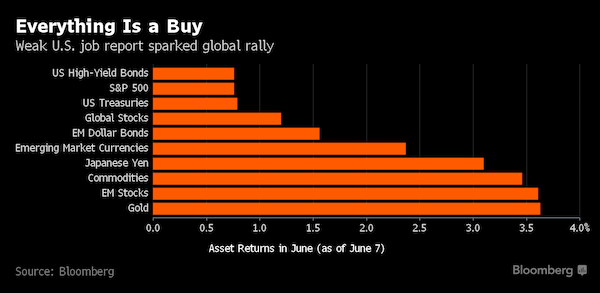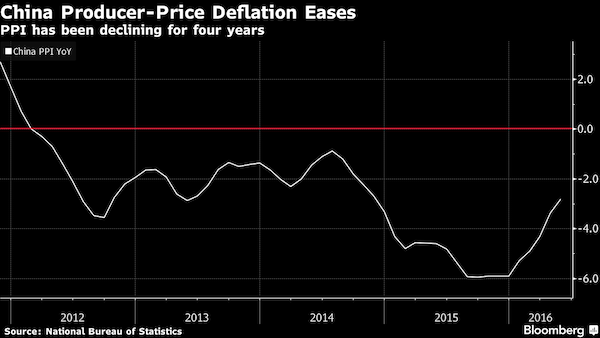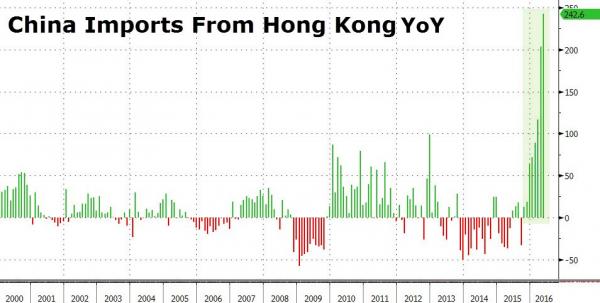
G. G. Bain Temporary footpath, Manhattan Bridge 1908



As per the apt title of my article yesterday, ‘the only thing that grows is debt’. Markets need price discovery to function, but right now it’s everyone’s biggest fear. “Oil at 8-month high!”
• Everything’s a Buy as Central Banks Keep on Greasing Markets (BBG)
Misery is making strange bedfellows in global markets. At a time when risky assets including stocks, commodities, junk bonds and emerging-market currencies are rallying to multi-month highs, so are the havens, from gold, government bonds to the Swiss franc and the Japanese yen. No matter that the U.S. labor market is deteriorating and the World Bank has just cut its estimates for global economic growth. Investors either don’t believe the news is bad enough to kill a global recovery that’s already long in the tooth, or they’re betting that sluggishness in some of the biggest economies means central banks will stay more accommodative for longer.
“Everything is being driven by high liquidity that ultimately is being provided by central banks,” Simon Quijano-Evans at Commerzbank, Germany’s second-largest lender, said in London. “It’s an unusual situation that’s a spill over from the 2008-09 crisis. Fund managers just have cash to put to work.” For much of the time since the financial meltdown eight years ago, investors have been in the mindset that bad economic data is good news for markets. The near-zero interest-rate policies by major central banks – and negative borrowing costs in Japan and some European nations – have pushed traders to grab anything that offers yield. And every indication that the liquidity punch bowl will stay in place is greeted by markets with a cheer.


Paraphrasing Springsteen: “Someday we’ll look back on this and it will all seem not one bit funny.”
• Draghi Starts Buying Junk Bonds, “Means Business” (BBG)
Since a surprise interest-rate cut at his first meeting as ECB President, Mario Draghi has shown a penchant for pushing the envelope. The bank’s entry into the corporate bond market on Wednesday was no exception: buying bonds with junk ratings. Purchases on the first day included notes from Telecom Italia, according to people familiar with the matter, who aren’t authorized to speak about it and asked not to be identified. Italy’s biggest phone company has speculative-grade ratings at both Moody’s Investors Service and S&P Global Ratings. The company’s bonds only qualifies for the central bank’s purchase program because Fitch Ratings ranks it at investment grade.
By casting his net as wide as the program allows, Draghi ensured that the first day of corporate bond purchases made an impact. While the ECB has said it would buy bonds from companies with a single investment-grade rating, investors expected the central bank to start with the region’s highest-rated securities. “It’s been an aggressive start to the program,” said Jeroen van den Broek at ING Groep in Amsterdam. “The wide-reaching nature of the purchases shows Draghi means business.” [..] Telecom Italia’s bonds are in Bank of America Merrill Lynch’s Euro High Yield Index and credit-default swaps insuring the notes against losses are part of the Markit iTraxx Crossover Index linked to companies with mostly junk ratings.
Moody’s and S&P have ranked Telecom Italia one level below investment grade, at Ba1 and an equivalent BB+ respectively, since 2013. Fitch puts the company at the lowest investment-grade rating and only revised its outlook on that level to stable from negative in November. “This dispels any doubts investors may have had about the commitment of the ECB and the central banks to tackle lower-rated names,” said Alex Eventon at Oddo Meriten Asset Management. “Telecom Italia is firmly at the weak end of the spectrum the ECB can buy.”

I’ll have to see it to believe it. Draghi buys everything not bolted down, but not Greece.
• FinMin: Greece In ECB’s QE Program By This Fall (Kath.)
Greece will enter the ECB’s quantitative easing (QE) program “soon,” Finance Minister Euclid Tsakalotos told Bloomberg in an interview on Wednesday. However, the Greek government’s optimism is not shared by banking sources and analysts, who estimate that Greece’s inclusion in ECB Governor Mario Draghi’s bond-buying program will be tied to the successful completion of the second bailout review in the fall, as well as the progress in talks on settling the problem of the Greek national debt.
In his interview Tsakalotos went as far as to say that Greece will join the QE program by September, stressing that such a development would open the way for the lifting of the capital controls and the gradual restoration of investor trust. He also said that the ECB will start accepting Greek bonds as collateral for loans after Athens completes the July debt repayments to Frankfurt. “I feel confident the Greek bonds will be eligible” by September, he predicted. He also forecast that once Greece enters the QE program, depending also on the decisions on the country’s debt, “you can take Grexit off the table,” referring to the possibility of a Greek exit from the eurozone. “Then you have a straight runway for investors,” he added in the same optimistic spirit.

Draghi’s got your back, guys.
• Europe Junk Borrowers Rush to Refinance Before Brexit Vote (BBG)
Junk-rated companies in Europe are hurrying to refinance debt, locking in borrowing costs at one-year lows amid concerns that a U.K. referendum on EU membership will paralyze markets. Leveraged-loan borrowers are poised to raise more money in euros this week for refinancing than in the whole of May, according to data compiled by Bloomberg. The amount amassed for repaying old debt from selling high-yield bonds is on track to be equal to about two-thirds of comparable sales last month. Companies including Altice and Verisure Holding have entered the market as the start of corporate-bond purchases by the ECB on Wednesday has driven down borrowing costs across the continent.
The window may prove short-lived as banks including Goldman Sachs have said a June 23 vote in favor of a Brexit could roil European markets and endanger economic growth. “It’s possible that uncertainty will rise as we approach the Brexit referendum,” said Colm D’Rosario at Pioneer Investment Management. “Issuers won’t want to wait until then.” Companies may sell about €2.5 billion of leveraged loans and at least €2.6 billion of high-yield bonds for refinancing this week, the Bloomberg data show.

The new reality: “..raw-material producer prices fell 7.2%, less than the prior month’s 7.7% decline..” And what does BBG call this? Yes, that’s right: “Firmer producer prices..”
• China’s Factory-Gate Deflation Eases Somewhat (BBG)
Deflationary pressures in China’s industries eased further in May, while consumer price gains continued to be subdued enough to offer the central bank scope for more easing if needed. Amid a drive by the Communist Party leadership to cut excess capacity, producer prices fell 2.8%, the least since late 2014 and less than the 3.2% decline economists had estimated in a Bloomberg survey. The consumer price index rose 2% from a year earlier, less than the median forecast of 2.2%. Easing factory-gate deflation is the latest signal of stabilization after more than four years of falling producer prices. Tepid consumer price gains may allow the People’s Bank of China, which has kept interest rates at a record low since October, room to add further stimulus in the short term to help prop up growth.
“The deflationary threat has substantially diminished,” said Raymond Yeung at Australia & New Zealand Banking Group in Hong Kong. “Domestic demand has stabilized so we don’t see a strong upward pressure either. We still think the PBOC will remain moderately accommodative.” [..] Mining and raw-materials producer prices slumped less in May than the previous month, though still recorded the biggest declines. Mining producer goods fell 9.6% last month, versus a 13% drop in April, while raw-material producer prices fell 7.2%, less than the prior month’s 7.7% decline, the statistics bureau reported.
“Firmer producer prices reflect a combination of factors,” Bloomberg Intelligence economists Tom Orlik and Fielding Chen wrote in a note. “Commodity prices are a big part of the picture, with oil and iron ore both down less sharply than in 2015. So, too, is slightly more resilient domestic demand. Capacity utilization remains extremely low in historical comparison, but has ticked up over the last few months.”


Different version of the graph I posted yesterday with the comment: “Where would China’s imports be without the fake invoices?”
• Chinese Trade Data Lies Exposed -Again- (ZH)
If March’s 116.5% surge in China imports from Hong Kong didn’t raise eyebrows as the veracity of the trade data, then perhaps following last night’s data drop, this month’s 242.6% explosion year-over in China imports from Hong Kong must at minimum deserve a second glance. As Bloomberg’s Tom Orlik previously noted, the implausible 242.6% YoY surge screams that China is clearly disguising capital flows… Trade mis-invoicing as a way to hide capital flows remains a factor. In the past, over-invoicing for exports was used as a way to hide capital inflows. The latest data show the reverse phenomenon, with over-invoicing of imports as a way of hiding capital outflows. Does this look “real”?


Yes, that’s right. Cheap oil is now bad, all of a sudden. Who could have thought? Oh wait, me.
• Cheap Oil Will Weigh On Global Economy, Says World Bank (G.)
Global growth will slow this year as oil exporters in the developing world struggle to cope with lower energy prices, the World Bank has said in its half-yearly economic health check. The benefit of cheaper oil prices for Europe, Japan and other oil importing nations, which has sustained their growth through 2015 and 2016, has failed to offset a slowdown in parts of Africa, Asia and South America that depend on selling energy to sustain their incomes. In one of the gloomiest predictions by an international forecaster, the bank said the effect of the collapse in oil income on developing countries would restrict global growth to 2.4% this year, well down on its January forecast of 2.9%.
In the UK the growth rate will be restricted to 2% this year and 2.1% in 2017 and in 2018. The US will also stabilise at about 2% annually for the next couple of years, while the eurozone will expand at a more modest 1.6% in 2016 and in 2017 before slipping to 1.5% in 2018. The tumbling price of metals and food on world markets last year hit emerging and developing economies without triggering a significant rise in spending by richer countries. The Washington-based bank, which lends more than £25bn a year to developing countries, said weaker global trade, a downturn in private and public investment and a slump in manufacturing added to the woes of economies that have become dependent on high oil prices to bolster growth.

They all pray for growing demand. There won’t be any.
• Gulf Nations Must Cut Deficits to Keep Currency Pegs, IMF Says (BBG)
Gulf oil exporters must cut spending and narrow their budget shortfalls to keep their currencies pegged to the dollar, the IMF said. While substantial foreign assets have allowed the six members of the Gulf Cooperation Council to fix the value of their currencies to the greenback, keeping the status quo comes at a price as lower crude prices strain public finances, the lender said in a report titled “Learning to Live with Cheaper Oil.” “When a country faces prolonged fiscal and external deficits, policy adjustment must come from fiscal consolidation measures,” the IMF said in the report authored by Martin Sommer, deputy chief of its regional studies division. Maintaining the currency pegs “will require sustained fiscal consolidation through direct expenditure cutbacks and non-oil revenue increases,” it said.
As investors increased bets that currency fixes may become too expensive to maintain, the United Arab Emirates and Saudi Arabia renewed their commitment to their pegs – with the latter also said to ban betting against its currency. Gulf oil producers’ budgets swung from surplus to deficit as Brent crude fell by as much as 75% from June 2014 to January this year, before a partial recovery in recent months. Even after cutting spending, the combined budget gap in the GCC region – which also includes Kuwait, Qatar, Bahrain and Oman – as well as Algeria is expected to reach $900 billion for the period 2016-2021, and represent 7% of their gross domestic product in the final year, the IMF said. Their debt-to-GDP ratio is expected to rise to 45% in 2021 from 13% last year as governments issue debt to plug their budget gaps.

Iceland’s learned a lesson or two.
• Hedge Funds’ Fast Money Not Welcome as Iceland Bolsters Defenses (BBG)
Iceland has gone its own way since its three largest lenders collapsed in 2008 under a mountain of debt almost eight times the size of its economy. The steps included capital controls that locked in hedge funds, mortgage writedowns and throwing bankers in jail. With the recovery well under way, the island nation – once a hedge fund paradise – is continuing on its isolated path. Lawmakers have effectively outlawed the kind of trade that inflated the bubble a decade ago, protecting against a repeat. Surrounded by sub-zero interest rates, Iceland’s benchmark gauge of 5.75%, the highest in the developed world, is luring cash from abroad. That’s unlikely to change any time soon.
“The problem is the ability to have an independent monetary policy and an independent monetary policy means the ability to have a different interest rate than the rest of the world,” central bank Governor Mar Gudmundsson said on Monday. “If that’s not possible, then you can’t have an independent monetary policy. And the problem of very significant interest rate differential – interest rates in Iceland are higher than the rest of the world – will not disappear overnight.” Both geographically and financially Iceland is a small island in vast, turbulent waters. Under the law enacted last week, the central bank over the weekend set rules that will force investors in Icelandic bonds to keep 40% of their investments in a 0% account for a year. That will limit the profit to be made from investing in Iceland, where government bonds offer yields of more than 6%.
Those type of returns are tempting in a world of near zero and even negative key rates. As evidence, the Icelandic krona has strengthened this year even as the central bank has been selling the currency to build up foreign holdings as it prepares to lift the capital controls that have been in place since 2008. But the country may have seen nothing yet, according to the governor. The new rules are a “precautionary” measure to stifle any major flows after the controls are lifted, he said. “There have been certain inflows in the last few months,” he said. “We thought there was a possibility of much greater inflows going forward, especially if the auction goes well and we take further steps to liberalize the capital account and the economy is booming and interest rates are high.”

As I’ve said many times, the EU is made up of sovereign countries, and they’re not going to give up their sovereignty, not a single one of them.
• Britain’s Defiant Judges Fight Back Against Europe’s Imperial Court (AEP)
The British judiciary has begun to draw its sword. For the first time since the European Court asserted supremacy and launched its long campaign of teleological conquest, our own judges are fighting back. It is the first stirring of sovereign resistance against an imperial ECJ that acquired sweeping powers under the Lisbon Treaty, and has since levered its gains to claim jurisdiction over almost everything. What has emerged is an EU supreme court that knows no restraint and has been captured by judicial activists – much like the US Supreme Court in the 1970s, but without two centuries of authority and a ratified constitution to back it up. This is what the Brexit referendum ought to be about, for this thrusting ECJ is in elemental conflict with the supremacy of Parliament. The two cannot co-exist. One or the other must give.
It is the core issue that has been allowed to fester and should have been addressed when David Cameron went to Brussels in February to state Britain’s grievances. It was instead brushed under the carpet. The explosive importance of Lisbon is not just that it enlarged the ECJ’s domain from commercial matters (pillar I), to broad areas of defence, foreign affairs, immigration, justice and home affairs, nor that this great leap forward was rammed through without a referenda – after the French and the Dutch had already rejected it in its original guise as the European Constitution. Lisbon also made the Charter of Fundamental Rights legally-binding. As we have since discovered, that puts our entire commercial, social, and criminal system at the mercy of the ECJ.
The Rubicon was crossed in Åklagaren v Fransson, a VAT tax evasion case in non-euro Sweden. The dispute had nothing to do with the EU. The Charter should come into force only when a country is specifically applying EU law. The ECJ muscled into the case on the grounds that since VAT stems from an EU directive, Sweden was therefore operating “within the scope of EU law”. This can mean anything, and that is the point. To general consternation, it ruled that Sweden had violated the double-jeopardy principle of Article 50 of the Charter. Almost nothing is safe when faced with a court like this, neither the City of London, nor our tax policies or labour laws, nor even our fiscal and monetary self-government. The ECJ can strike down almost any law it wants, with no possibility of appeal.

The EU slowly but surely forces Greece to take in 10s of 1000s of refugees on a -much more- permanent basis. But Erdogan can send a million more.
• Greek Asylum Service Starts Process Of Recording Applications (Kath.)
Greece’s asylum service on Wednesday launched a new scheme for processing registrations from migrants who want to apply for asylum in the country, a process that could take up to a year for many of the applicants, according to sources. The “recognition documents” issued to migrants to date will have their validity extended to cover a year. Many of the documents held by migrants in camps across the country have expired as they apply for six months for Syrians and just one month for all other nationalities.
Once the migrants have been registered, they will be issued with a yellow bracelet bearing their name and other personal details. The registration document and bracelet will grant each migrant the right to legal residence in Greece and access to free healthcare but will not give them permission to work in Greece which must be sought separately. The applicants will be informed by SMS about their interview, according to an official of Greece’s asylum service who said the interview could take place several months after their application “due to the large population of refugees in the country.”

Got the feeling he’s just getting started.
• Erdogan’s Draconian New Law Demolishes Turkey’s EU Ambitions (G.)
Any chance Turkey could join the EU by 2020, as Brexit campaigners have asserted, went up in smoke on Wednesday after the country’s president, Recep Tayyip Erdogan, signed a draconian new law that in effect demolishes any notion that his country is a fully functioning, western-style democracy. EU rules dating to 1993, known as the Copenhagen criteria, insist all applicant states must adhere to a system of democratic governance and uphold other basic principles, such as the rule of law, human rights, freedom of speech, and protection of minorities. Turkey is struggling to meet these standards. The new measures make EU membership even more of a chimera.
They are expected to eviscerate parliamentary opposition to Erdog an’s ruling neo-Islamist Justice and Development party (AKP) by allowing politically inspired, criminal prosecutions of anti-government MPs. The main target is the pro-Kurdish Peoples’ Democratic party (HDP), which Erdog an accuses of complicity in terrorism, although other opposition parties are also affected. By signing the new law, Erdog an, who has dubbed the EU a “Christian club”, has signalled the end of any realistic chance of Turkey joining the union for the foreseeable future. Critics say he may also have sounded the death knell for Turkey’s secular democracy and set the stage for intensified armed conflict with Kurdish groups. Erdogan’s move comes against a backdrop of heightened violence between Turkey’s security forces and militants belonging to the outlawed Kurdistan Workers’ party (PKK) and its radical offshoots.









Home › Forums › Debt Rattle June 9 2016